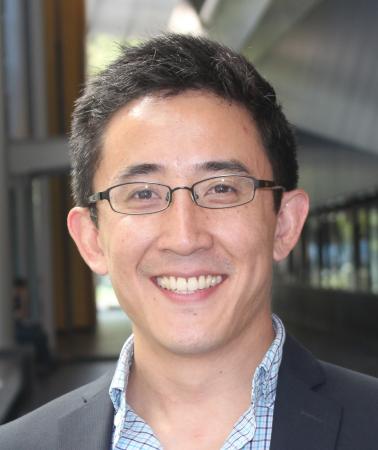Gabe Kwong, assistant professor in the Wallace H. Coulter Department of Biomedical Engineering at Georgia Tech and Emory, was named a recipient of the National Institutes of Health (NIH) New Innovator Award on Oct. 4.
The High-Risk, High-Reward Research (HRHR) program, supported by the National Institutes of Health (NIH)’s Common Fund, awarded 88 grants to highly creative and exceptional scientists with bold approaches to major challenges in biomedical research. The awards span the broad mission of the NIH and include groundbreaking research, such as engineering immune cells producing drugs at the site of diseased tissue; developing a sensor to rapidly detect antibiotic resistance of a bacterial infection; understanding how certain parasites evade host detection by continually changing their surface proteins; and developing implants that run off the electricity generated from the motion of a beating the heart.
“The program continues to support high-caliber investigators whose ideas stretch the boundaries of our scientific knowledge,” said NIH Director Francis S. Collins, M.D., Ph.D. “We welcome the newest cohort of outstanding scientists to the program and look forward to their valuable contributions.”
Kwong is a recipient of the New Innovator Award for his project “Noninvasive and Predictive Biomarkers of Organ Transplant Rejection.” His research program is directed towards the advancement of human health by developing biomedical technologies that draw from the fields of engineering and immunology.
“Detecting early signs of organ transplant rejection is critical for the survival and health of the recipient, but the diagnostic gold standard is the biopsy – it is invasive and lacks predictive power. Our proposal is to develop an entirely new class of synthetic biomarkers that have the capacity to amplify disease signals and predict the onset of rejection at the earliest stages,” said Kwong.
NIH traditionally supports research projects, not individual investigators. However, the HRHR program seeks to identify scientists with ideas that have the potential for high impact, but may be at a stage too early to fare well in the traditional peer review process. These awards encourage creative, outside-the-box thinkers to pursue exciting and innovative ideas in biomedical research.
In 2016, the NIH issued 12 Pioneer awards, 48 New Innovator awards, 12 Transformative Research awards, and 16 Early Independence awards. The awards total approximately $127 million and represents contributions from the NIH Common Fund; the National Cancer Institute; National Heart, Lung, and Blood Institute; National Institute of Environmental Health Sciences; National Institute of General Medical Sciences; National Institute of Mental Health; and the Big Data to Knowledge initiative.
About the National Institutes of Health (NIH): NIH, the nation's medical research agency, includes 27 Institutes and Centers and is a component of the U.S. Department of Health and Human Services. NIH is the primary federal agency conducting and supporting basic, clinical, and translational medical research, and is investigating the causes, treatments, and cures for both common and rare diseases. For more information about NIH and its programs, visit www.nih.gov.
Media Contacts:
Communications Manager
Wallace H. Coulter Department of Biomedical Engineering
Georgia Institute of Technology
Media Contact
Media Contacts:
Communications Manager
Wallace H. Coulter Department of Biomedical Engineering
Georgia Institute of Technology
Keywords
Latest BME News
Jo honored for his impact on science and mentorship
The department rises to the top in biomedical engineering programs for undergraduate education.
Commercialization program in Coulter BME announces project teams who will receive support to get their research to market.
Courses in the Wallace H. Coulter Department of Biomedical Engineering are being reformatted to incorporate AI and machine learning so students are prepared for a data-driven biotech sector.
Influenced by her mother's journey in engineering, Sriya Surapaneni hopes to inspire other young women in the field.
Coulter BME Professor Earns Tenure, Eyes Future of Innovation in Health and Medicine
The grant will fund the development of cutting-edge technology that could detect colorectal cancer through a simple breath test
The surgical support device landed Coulter BME its 4th consecutive win for the College of Engineering competition.








